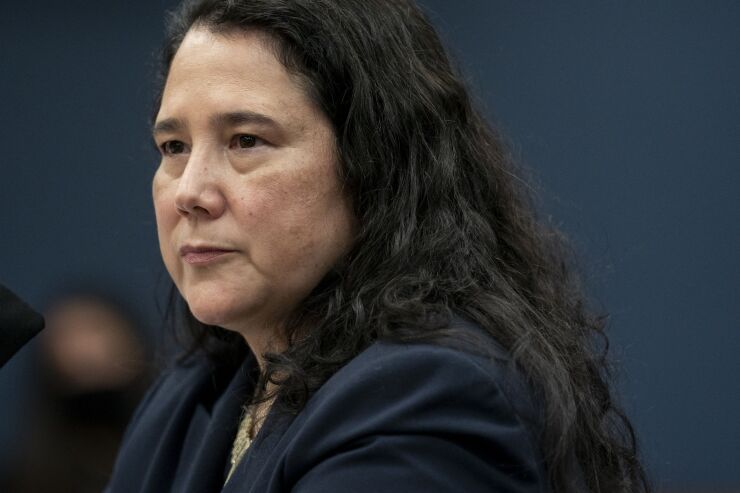
Following the departure of a pivotal Small Business Administration official, lawmakers from both parties are calling on the agency to suspend implementation of controversial rules that could let fintech lenders make 7(a) loans.
Associate Administrator Patrick Kelley — who had headed SBA's Office of Capital Access since March 2021 and has been overseeing adoption of the changes — left the SBA May 11. The leadership of the House and Senate Small Business committees wrote SBA Administrator Isabela Casillas Guzman Wednesday, urging her to "pause" the two new rules until Kelley's successor is installed.
Kelley's exit, which appeared to catch lawmakers off guard, "leaves a void in leadership at a time when such leadership will be key," Sen. Ben Cardin, D-Maryland, Sen. Joni Ernst, D-Iowa, Rep. Roger Williams, R-Texas, and Rep. Nydia Velazquez, D-N.Y., wrote.
An SBA spokesperson praised Kelley's track record but didn't address concerns about his departure.
Kelley helped to "deliver billions of dollars in capital to America's small business owners during a once-in-a-generation pandemic and beyond," the spokesperson said. "His leadership and experience have been instrumental to reforming and modernizing the agency's capital programs for the future. We are very grateful for his important contributions and unwavering commitment to the mission of the SBA."
The
Those pleas grew stronger this week as Tony Wilkinson, longtime president and CEO of the National Association of Government Guaranteed Lenders, called on lawmakers to "act quickly to reverse these rule changes through a bipartisan legislative approach" in testimony Wednesday before the House Small Business Committee.
"Otherwise, SBA is inviting in the exact kind of behavior and risk that could erode the 7(a) loan program's performance and reputation, and even harm the very borrowers they are intending to help," Wilkinson added.
Critics of the new rules, including Wilkinson, believe they will inject more risk and ultimately a higher level of loan losses into 7(a) lending. More losses could result in the need for a subsidy from Congress. Currently, fees paid by lenders and borrowers are more than sufficient to cover 7(a)'s credit costs.
Critics have also focused on numerous reports, from
Testifying at the same hearing on behalf of the Independent Community Bankers of America, Alice Frasier, president and CEO of the $792 million-asset Potomac Bancshares in Charles Town, West Virginia, said the rules, which she claimed were "rushed through the process without input by Congress or the industry," would undermine SBA's stated purpose of boosting capital access to underserved groups. Rather than calling for a legislative fix, Frazier suggested SBA should "hit the pause button" and convene a working group of current 7(a) lenders to brainstorm new ways of reaching "the smallest businesses and entrepreneurs."
Republican lawmakers have emerged as some of the toughest critics of the rules. At a House Small Business Committee hearing last week, Kelley engaged in contentious exchanges with Rep. Blaine Luetkemeyer, R-Mo., and Rep. Tony Meuser, R-Pa. However, Democrats, too, have questioned the wisdom of the course the SBA has set. Velazquez said she was "especially concerned" by the agency's ending the moratorium and permitting more nondepository lenders into 7(a).
"We will be doing a disservice to American small-business owners by moving forward with changes that weaken and destabilize a highly successful program that has helped millions of entrepreneurs," Velazquez said during the hearing last week.
"I've heard from financial institutions again and again just how concerned they are about the implementation of these rules," Rep. Hillary Scholten, D-Mich, said.
For Velazquez and colleagues on both sides of the aisle in the House and Senate, adding small business lending companies — many of which could be fintechs — is a particular concern because SBA has traditionally said it lacked capacity to underwrite large numbers of nondepository lenders. Indeed, that was the reason the cap was put in place in January 1982.
SBA's ultimate aim in proposing the new rules is improving access to capital for underserved groups. Agency officials have said SBLCs are more likely than banks to make small-dollar loans of $150,000 or less, whose number has declined in recent years, Kelley testified last week. But banking advocates, including Wilkinson, have noted small-dollar loans have increased significantly in the current fiscal year.
"The numbers don't show the market failure SBA describes," Ami Kassar, CEO of Multifunding LLC, a Philadelphia-based loan brokerage and consulting firm, said Wednesday in testimony before the House Small Business Committee.
In addition to canceling the longstanding moratorium, the rules also did away with a number of underwriting guidelines, including a requirement for a loan authorization document detailing loan terms and conditions. The new affiliation rule pared back the number of credit criteria that lenders — including nondepository SBLCs — are required to consider from nine to three. The affiliation rule also stated that lenders could use their standards for similarly sized conventional loans in underwriting 7(a) credits. According to Wilkinson, SBA has described this policy as allowing lenders to "do what you do."
"This is not streamlining," Wilkinson said Wednesday. "Every principle included in the now-deleted list of underwriting criteria was put there to address a specific concern. … I believe that removing these guardrails could create a race to the bottom in terms of the conditions that individual lenders will impose on individual loans."
In an email to American Banker, Arne Monson, president of Holtmeyer and Monson, an SBA servicing firm based in Memphis, stated that few if any of his clients support the new rules. "They think this proposal is not well thought through," Monson wrote. "It is clear Administrator Guzman is dedicated to the notion of spurring lending to underserved communities, and people of color. This may be a noble notion, but where do lenders making a prudent credit decision come into play?"
In a statement Wednesday, the American Bankers Association warned the new rules "may negatively impact the performance of loans made under the 7(a) program, threaten the integrity of the program, and lead to increased borrower and lender fees."






